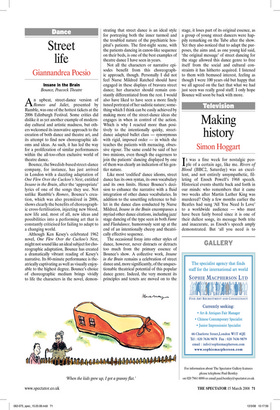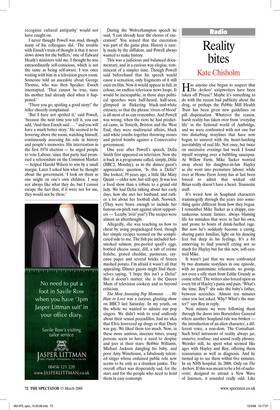Making history
Simon Hoggart
It was a fine week for nostalgic people of a certain age, like me. Rivers of Blood (BBC2, Saturday) was an excellent, and not entirely unsympathetic, filleting of Enoch Powell’s 1968 speech. Historical events shuttle back and forth in our minds: who remembers that it came two weeks after Martin Luther King was murdered? Only a few months earlier the Beatles had sung ‘All You Need Is Love’ to a worldwide audience — who must have been fairly bored since it is one of their dullest songs, its message both trite and inaccurate, as Enoch’s speech amply demonstrated. But ‘all you need is to recognise cultural antipathy’ would not have caught on.
I never thought Powell was mad, though many of his colleagues did. ‘The trouble with Enoch’s train of thought is that it never slows down for the buffers,’ one of Edward Heath’s ministers told me. I thought he was extraordinarily self-conscious, which is not the same as being self-aware. I was once waiting with him in a television green room. Someone told an anecdote about George Thomas, who was then Speaker. Enoch interrupted. ‘That cannot be true, since his mother had already died when it happened.’ ‘There you go, spoiling a good story!’ the teller cheerily complained.
‘But I have not spoiled it,’ said Powell, ‘because the next time you tell it, you can add, “And then Enoch said... ” and you will have a much better story.’ He seemed to be hovering above the room, watching himself, continuously assessing his role in history and people’s memories. His intervention in the first 1974 election — he urged people to vote Labour, since that party had promised a referendum on the Common Market — helped Harold Wilson to win by a small margin. Later I asked him what he thought about the government. ‘I look on them as one might on one’s own children. I may not always like what they do, but I cannot escape the fact that, if it were not for me, they would not be there.’ During the Wolverhampton speech he said, ‘I can already hear the chorus of execration!’ You sensed that the execration was part of the game plan. History is rarely made by the diffident, and Powell always wanted to make history.
This was a judicious and balanced documentary, and in a curious way elegiac, reminiscent of a simpler time. Though Powell said beforehand that his speech would cause a sensation, only fragments of it still exist on film. Now it would appear in full, in colour, on endless television news loops. It would be inescapable; in those days political speeches were half-heard, half-seen, glimpsed in flickering black-and-white extracts, so that the phrase ‘rivers of blood’ is all most of us can remember. And Powell was wrong; when the riots he had predicted came, in Toxteth, Brixton and the West End, they were multiracial affairs, black and white youths together throwing stones and petrol bombs against a Conservative government.
One year after Powell’s speech, Delia Smith first appeared on television. Now she is back in a programme called, simply, Delia (BBC2, Monday), as in the dinner guest’s appreciative question, ‘Is this a Delia?’ She looked, 39 years ago, a little like Mary Quant — older now, but still spry. It was less a food show than a tribute to a grand old lady. We had Delia talking about her early days, how she met her husband, and rather a lot about her football club, Norwich. (They were brave enough to include her famous on-pitch rant against silent supporters — ‘Lezzby ’avin’ you!’) The recipes were almost an afterthought.
Allegedly, she was teaching us how to cheat by using prepackaged food, though her simple recipes seemed on the complicated side to me. The fish pie included hotsmoked salmon, pre-peeled quail’s eggs, bottled cheese sauce, dill, a tub of crème fraîche, grated cheddar, parmesan, cayenne paper and several bricks of frozen mashed potato. I’m afraid it wasn’t all that appealing. Dinner guests might find themselves saying, ‘I hope this isn’t a Delia!’ But it doesn’t matter; she is the Queen Mum of television cookery and so beyond criticism.
The Most Annoying Pop Moments ... We Hate to Love was a curious, gloating show on BBC3 last Saturday. In my youth, on the whole we wanted to admire our pop singers. We didn’t wish to read endlessly about their sexual peccadillos, had no idea that Elvis hoovered up drugs or that Dusty was gay. We liked them too much. Now, in these more anxious, insecure times, young persons seem to have a need to despise and jeer at their stars: Robbie Williams, Michael Jackson dangling his baby, and poor Amy Winehouse, a fabulously talented singer whose ordained public role now seems to be only as a drunken junkie. The overall effect was desperately sad, for the stars and for the people who need to hold them in easy contempt.



























































































 Previous page
Previous page